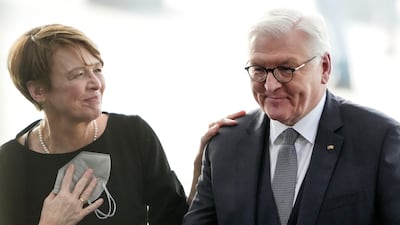Frank-Walter Steinmeier was re-elected as president of Germany on Sunday after the four largest parties in parliament united around his candidacy.
Mr Steinmeier, 66, is only the fourth president in post-war Germany to win a second term after he took more than two-thirds of the vote from a special 1,472-member assembly.
The president has mainly ceremonial duties, but is regarded as an important moral voice for the nation, and Mr Steinmeier has won praise from across the political spectrum for promoting unity and democracy at a time of crises and divisions.
“The office of president is above party politics, and I promise I will carry it out that way,” he said as he accepted his election. "I will be non-partisan, but I am not neutral when it comes to democracy."
In recent months Mr Steinmeier has sounded warnings over what he called growing divisions and radicalisation linked to protests against coronavirus restrictions.
“At this time when there’s so much aggression in society, it’s important to send a cross-party signal” by uniting behind Mr Steinmeier, said Armin Laschet, until recently the leader of the conservative opposition in parliament.
That opposition bloc chose not to run a candidate against Mr Steinmeier, virtually guaranteeing his victory after his own Social Democrats and their two coalition partners supported his candidacy.
Chancellor Olaf Scholz, also a Social Democrat, congratulated Mr Steinmeier and said he had "given the people guidance in difficult times".
The smaller far-left Linke party, the far-right Alternative for Germany (AfD) and the minor Free Voters put forward rival candidates in Sunday’s vote by the special Federal Convention.
The assembly consists of the 736 members of the national parliament, including Mr Scholz and other cabinet ministers, plus an equal number of nominees put forward by the 16 states.
These can include celebrities or private citizens, with former chancellor Angela Merkel and Bayern Munich footballer Leon Goretzka among this year’s delegates.
Because of coronavirus, they did not gather in the main parliamentary chamber as usual but were spread across multiple floors of an adjacent building in Berlin. The national anthem was played but not sung for the same reason.
“Our society seems to have lost a lot of what unites it,” said parliament speaker Baerbel Bas in an opening speech to the delegates.
“Let us hold together, look for what unites us – all of us together and the president we are electing today”.
Mr Steinmeier served two separate terms as foreign minister before he was elected president in 2017, succeeding former East German pastor Joachim Gauck.
A messy general election result later that year thrust Mr Steinmeier back into the political fray as he resisted calls to order a second vote and urged bickering parties to agree a coalition deal, which they eventually did.
In his role as a bridge-builder during the pandemic, he recently held a public debate between health experts and vaccine sceptics as MPs considered making immunisations compulsory.
The president has reserve powers to dissolve parliament or block legislation in certain situations, but these are rarely used.


